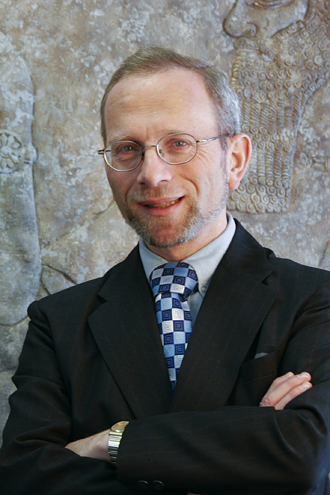The Americanization of Hanukkah
Jonathan Sarna '75, MA'75, the Joseph H. and Belle R. Braun Professor of American Jewish History, discusses the growing prominence of Hanukkah on the Jewish American calendar
 Photo/Mike Lovett
Photo/Mike LovettProfessor Jonathan Sarna
During the last century, the celebration of Hanukkah in the United States has transformed from a minor festival into one of American Jews’ most widely observed holidays. Jonathan Sarna '75, MA'75, the Joseph H. and Belle R. Braun Professor of American Jewish History at Brandeis and chief historian of the new National Museum of American Jewish History, sat down with BrandeisNOW to talk about why Americans’ observation of Hanukkah has changed, and how.
Why has the celebration of Hanukkah become more popular in America, and what factors have driven the changes?
Hanukkah has moved from being a very minor Jewish festival scarcely mentioned in most American Jewish sources to being one of the most popular and widely observed holidays on the American Jewish calendar. The driver behind this was that Christmas became increasingly central in 19th-century America, the day for giving gifts to children, eventually becoming a national holiday. As a result of all that, Hanukkah was infused with a vast new energy, in the hope that it might compete with Christmas or at least allow Jewish children to see that they are as fortunate as their Christian neighbors. Hanukkah grew in tandem with Christmas, and in many ways as a response to it.
Is Hanukkah celebrated differently in America and Europe?
Today, the differences are not so vast. But in the 19th century, gift giving was not really done on Hanukkah. It was a time when one lit candles; and ate special foods, usually fried in oil; and gave gifts of money known as Hanukkah gelt to youngsters for games. But the notion of gift giving was not known, nor were homes especially decorated, nor were Hanukkah cards exchanged.
Did the expansion of gift giving change the level of importance American Jews placed on Hanukkah as a religious holiday?
The strengthening of Hanukkah allowed American Jews to participate as equals in what came to be known as the “holiday season.” Today, we have both a so-called national Christmas tree and a national menorah. But Jews nevertheless stress that their holiday is different from the holiday of the majority faith. They maintain their identity as a minority faith even as they participate as equals in a majority culture that highlights good cheer, bright lights and gift giving.
How did the Jewish community respond to the changes?
Most people don’t realize that Hanukkah has changed over time. Many American Jews assume that Hanukkah has always been the way it is today. In the past, people were distressed that Purim, the traditional holiday of gift giving, which takes place about 10 weeks after Hanukkah, declined. Obviously, as Hanukkah was magnified, a lot of energy was sucked away from Purim, which is still celebrated today but is definitely secondary.
Were Christians influenced by Hanukkah’s rise?
In some ways, both Christmas and Hanukkah underwent changes. This is frequently the case when religions interact. Christians over time became aware that many Americans do not celebrate Christmas. Today, as a result, many public squares feature both menorahs and Christmas trees. Jews, for their part, have made peace with the fact that Hanukkah, once a holiday celebrating anti-assimilation, has instead become an occasion for Jews to participate in the holiday season.
Does the influence of American or Christian customs on American celebrations of Hanukkah have an impact on the Jewish identity or the practice of Judaism?
It depends on how the influences are incorporated. If the quest is simply to create new traditions around Hanukkah and find ways to make it more popular for children, that can strengthen the faith. But if Hanukkah is not distinguished from the majority holiday of Christmas, it could easily lose its separate identity.
Ironically, the message of Hanukkah is one of anti-assimilation. It’s rooted in the story of how the Maccabees steadfastly refused to follow in the ways of their neighbors and surrender their distinctiveness. I believe the relationship of Hanukkah and Christmas mirrors the relationship of Judaism and Christianity within the larger culture. Jews want to be part of the larger culture and simultaneously want to stand apart from it. They seek to be different but also to be accepted as equal.
Categories: General, Humanities and Social Sciences





